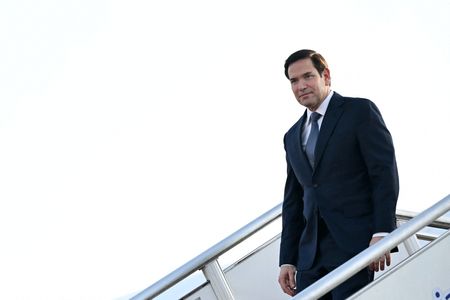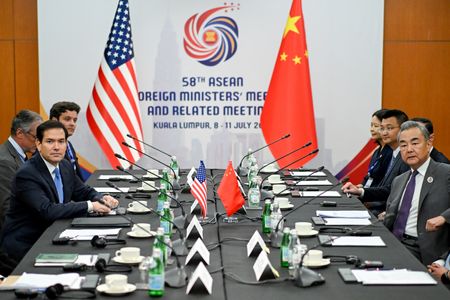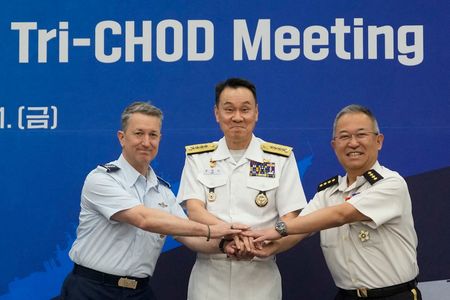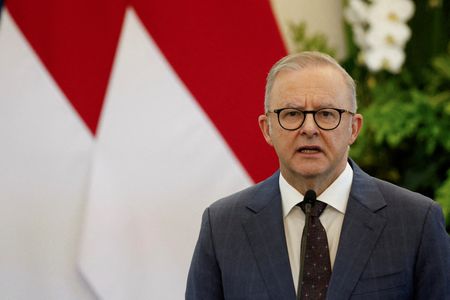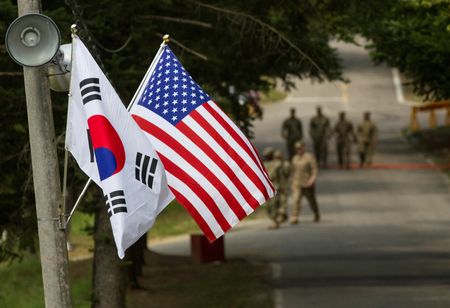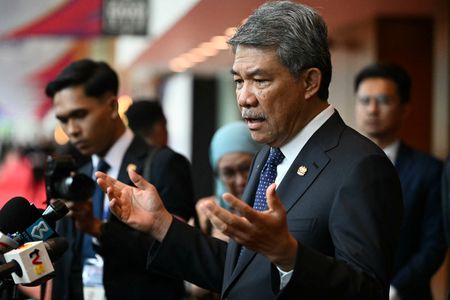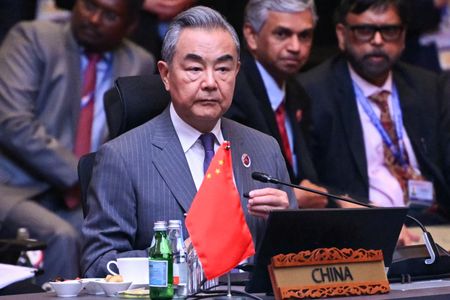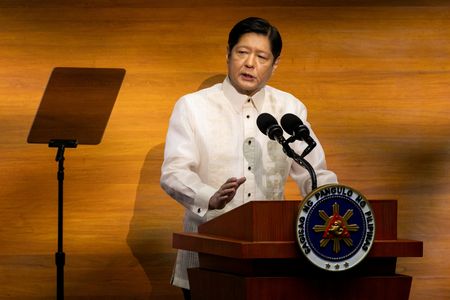By Daphne Psaledakis and Rozanna Latiff
KUALA LUMPUR (Reuters) -U.S. Secretary of State Marco Rubio met counterparts in Southeast Asia on Thursday during his first visit to Asia since taking office, seeking to reassure them that the region is a U.S. priority despite President Donald Trump’s tariff offensive.
Washington’s top diplomat joined foreign ministers of the 10-member Association of Southeast Asian Nations in Kuala Lumpur at a meeting that includes Australia, China, the European Union, Japan, Russia, South Korea and others.
The visit is part of an effort to renew U.S. focus on the Indo-Pacific and look beyond conflicts in the Middle East and Europe that have consumed much of the Trump administration’s attention.
“The story of the next 50 years will largely be written here in this region,” Rubio told ASEAN ministers, describing the Indo-Pacific as a “focal point of U.S. foreign policy.”
“When I hear … that perhaps the United States or the world might be distracted by events in other parts of the planet, I would say distraction is impossible,” Rubio added.
However, Trump’s global tariff strategy has cast a shadow over the trip after he unveiled steep tariffs from August 1 on eight ASEAN members, including Malaysia, as well as on close Northeast Asian allies Japan and South Korea.
In a sign of the upset, Japanese Prime Minister Shigeru Ishiba told a television news programme that Japan needed to wean itself from U.S. dependence in key areas.
“If they think Japan ought to follow what America says as we depend heavily on them, then we need to work to become more self-sufficient in security, energy and food, and less dependent on America,” he said.
Analysts said Rubio would be looking to press the case that the United States remains a better partner than China, Washington’s main strategic rival.
“Rubio said the right things but has limited ability to reassure considering the underlying dynamics,” said Gregory Poling, a Southeast Asia expert at Washington’s Center for Strategic and International Studies.
“All of these countries were receiving letters from the White House with their new tariff rates at the same time Rubio was trying to message continuity.”
Christopher Johnstone, a former Biden White House official now with the Asia Group consultancy, said trade frictions, U.S. pressure over defense spending, and uncertainty about U.S. defense commitments had pushed U.S.-Japan tension to a level probably not seen in a generation. But reducing Tokyo’s reliance on the U.S., he added, was easier said than done.
“And if the two countries reach a trade agreement by August 1, it could fade,” he said. “But Ishiba’s comments reflect sentiment that is real and widespread.”
FRANK EXCHANGE
Rubio also held talks with Russian Foreign Minister Sergei Lavrov, their second in-person meeting, at a time when Trump has grown increasingly frustrated with Russian President Vladimir Putin as the war in Ukraine drags on.
Rubio said he had a frank discussion and reinforced Trump’s disappointment that there has not been more Russian flexibility.
“We need to see a roadmap moving forward about how this conflict can conclude,” Rubio told reporters.
Russia’s foreign ministry said there was “a substantive and frank exchange of views” on the situation around Ukraine, Iran and Syria.
Rubio said he may also meet with Chinese counterpart Wang Yi this week.
Lavrov met Wang, who said China and Russia should strengthen coordination to promote Middle East peace and push for dialogue on the Iran nuclear issue.
“Peace cannot be achieved through force, and applying pressure won’t solve problems,” Wang said, according to the foreign ministry in Beijing.
Wang separately pledged China’s help to boost ASEAN’s capacity to implement the Regional Comprehensive Economic Partnership, an Asian trade pact Beijing is backing.
Rubio addressed the tariff issue in speaking to reporters.
“Of course it’s raised,” he said. “It’s an issue, but I wouldn’t say it solely defines our relationship with many of these countries. There are a lot of other issues that we work together on.”
He said a high-level delegation, including U.S. Commerce Secretary Howard Lutnick and Deputy Secretary of State Christopher Landau, would travel to Japan next week.
PERFECT STORM
Export-reliant ASEAN is collectively the world’s fifth-biggest economy. Only Vietnam has secured a deal with Trump to lower its levy to 20% from an initial 46%.
Trump has also upset another key Indo-Pacific ally, Australia, which said on Wednesday that it was “urgently seeking more detail” on his threat of 200% tariffs on pharmaceutical imports.
At a meeting with ASEAN, China, Japan and South Korea, Malaysian Foreign Minister Mohamad Hasan said Asia was being tested and is facing “the perfect storm.”
“Unilateralism and nationalism are on the rise, marginalising multilateralism that is essential for a stable world order,” he said.
The U.S. State Department said Rubio discussed building resilient critical mineral supply chains and security of AI chip technologies with Malaysian Prime Minister Anwar Ibrahim.
Anwar said in video released by his office that tariffs were the first item for discussion.
“He knows Malaysia is a major trading country for them in this region and he pledged to consider and extend our views (to Trump),” Anwar said.
A draft joint ASEAN communique seen by Reuters, preceding news of the latest tariff rates, shows that ASEAN foreign ministers, without specifically mentioning the U.S., will express concern about rising global uncertainties “particularly the unilateral actions relating to tariffs”.
(Reporting by Daphne Psaledakis, Rozanna Latiff and Danial Azhar in Kuala Lumpur; Liz Lee in Beijing, David Brunnstrom in Washington and Lucy Papachristou; Editing by Martin Petty, Clarence Fernandez, Chizu Nomiyama and Matthew Lewis)

